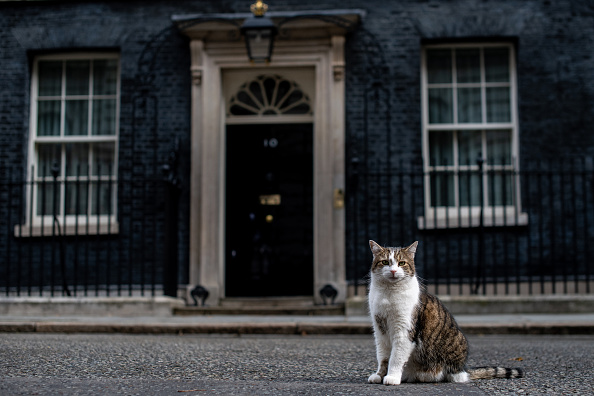A truly radical and pragmatic Prime Minister would let parliament get a cat

Parliament is infested with vermin.
According to an internal report seen by the MailOnline, the Westminster war on mice is being lost, despite £111,498 spent on pest control last year.
As political conundrums go, this one has an obvious solution: allow cats on the parliamentary estate. Lots of them.
Practical, inexpensive, and ruthlessly effective, this approach has been rejected. Dogs are allowed, but cats aren’t, ostensibly for health and safety reasons, despite the fact that sharing an office with a cat is much healthier and safer than mice chewing through wires and leaving droppings all over official documents.
And thus the moral divide defeats pragmatism in politics once again.
I bring this up not just because I love cats, but because it showcases the blind spot often suffered by politicians when it comes to tackling a problem from the perspective of what might work, rather than what they believe ought to.
This attitude is personified by the recently departed Theresa May, not just in her dogged insistence on trying to ram through the same flawed Brexit deal, but in her blinkered approach to a host of policy issues.
From the fixation on the net migration cap (leading to a draconian Home Office regime that barred talented individuals from working in the UK), to an ideological aversion to medical cannabis (forcing desperate parents to travel abroad to get treatment for their chronically ill children), to a refusal to relax planning laws to tackle the housing crisis, May’s government was defined by stubbornness and lack of creativity.
But now there’s a new Prime Minister in town, with a team who, it seems, are bursting with ideas.
There’s Rishi Sunak, chief Treasury secretary, who has written in City A.M. about restoring the nation’s faith in capitalism by designing a bond market for ordinary savers to invest in Britain’s SMEs.
There’s Esther McVey, who, if she sticks around as housing minister longer than her many predecessors, is determined to design policy under her “blue-collar Conservatism” banner – looking for ways to help small builders, families trying to extend properties, and communities wanting to repurpose existing buildings for housing.
Freshly promoted Liz Truss has been a libertarian and free trade champion for years. And today, the new trade secretary is announcing a policy to establish freeports – tariff-free zones around ports that can help spur manufacturing and industry in left-behind parts of the country, particularly in the north.
Meanwhile, two of the Prime Minister’s top aides have been vocal supporters of legalising medicinal cannabis, and Boris Johnson has thankfully abandoned the misguided and counterproductive migration target, promising instead a kind of points-based system to ensure that Britain can get the talent that it needs – and even advocating an amnesty for illegal immigrants.
All of this, naturally, is taking a back seat to the government’s twin priorities of getting Britain out of the EU and preparing for the election that will be necessary to either achieve this or manage the fall-out.
When that election does happen, Brexit will still dominate. But beyond that, we are at least starting to get the very slightest sense from this new team that, instead of reheating tired old policies along ideological lines, they could be prepared to look at fresh ideas – ones that might even attract new voters.
In today’s polarising political landscape, this is radical. For the last three years, many in the main parties have retreated to attacking people who dare to not vote for them, rather than asking themselves why.
If you don’t support Jeremy Corbyn’s socialist vision, Labour doesn’t want your vote anyway, as seen by the glee from the left when Tony Blair’s former spinner Alastair Campbell announced that he no longer felt the party was his home.
And if you’re not white and have the audacity to be a Conservative, like a record number of the Boris cabinet, Corbyn’s online army will accuse you of being a traitor to your race, instead of asking why the Tories might be more attractive to some ethnic minorities than Labour – or even if ethnicity matters as much as they think it does.
On the other side, if you don’t support the Tories, you’re turning your back on the democratic mandate of the referendum and don’t believe in your country – unless you’re voting for Nigel Farage’s new Brexit Party, that is, for whose supporters any concern about the impact of no-deal is tantamount to treason.
This hyperbolic rhetoric of alienation has turned political strategy on its head. Instead of setting out to convince undecided voters, the debate has morphed into a competition to see who can demonise their opponents’ supporters the most.
Now, there are hints that some in the new regime are looking at regional and demographic groups that don’t traditionally vote Tory and considering ways to win them over.
The morality argument (“vote for us because we’re right, the other side is wrong, and you’re unethical if you don’t”) may finally be shifting back to the realistic one (“vote for us because we’ve looked at the evidence and designed policies that will help people like you”).
We are, alas, unlikely to see much progress on housing, cannabis, or SME bonds until after Brexit is sorted, though there is more of a chance for freeports and a sensible approach to immigration. But at least there is now hope that pragmatism could be due for a comeback.
Until then, the least the Prime Minister could do if he wants an easy win is to drop the anti-feline dogma and let parliament get a cat or two.
Main image credit: Getty